Samsung Galaxy Tab Pro 8.4 and 10.1 Review
by Jarred Walton on March 22, 2014 9:30 PM ESTPerformance Benchmarks
In the world of laptops where I come from, we’re fast reaching the point – if not well beyond it – where talking about raw performance only matters to a small subset of users. Everything with Core i3 and above is generally “fast enough” that users don’t really notice or care. For tablets, the difference in speed between a budget and a premium device is far more dramatic. I’ve included numbers from the Dell Venue 8, which I’ll be providing a short review of in the near future. While the price isn’t bad, the two Samsung tablets feel substantially snappier – as they should. We’ll start with the CPU/system benchmarks and then move to the GPU/Graphics tests.
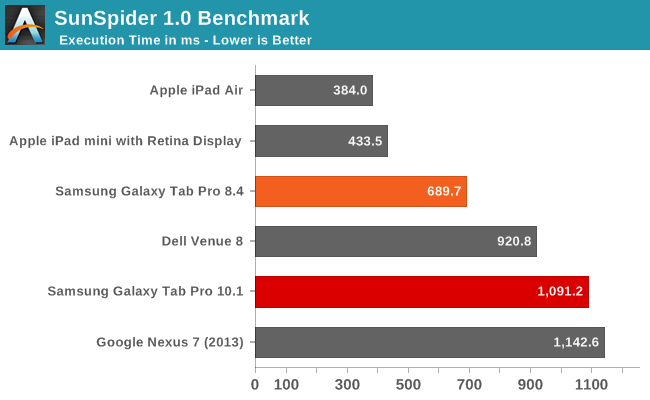
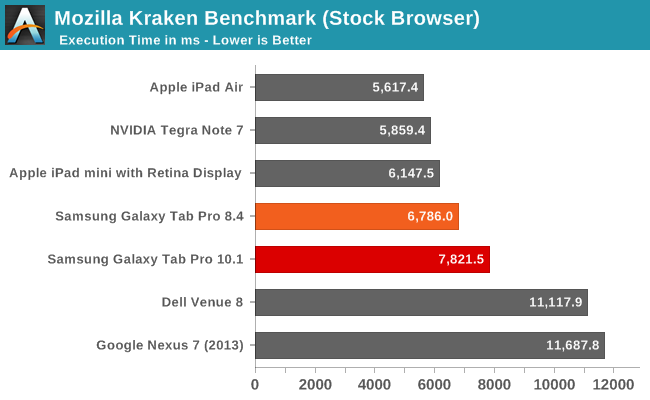
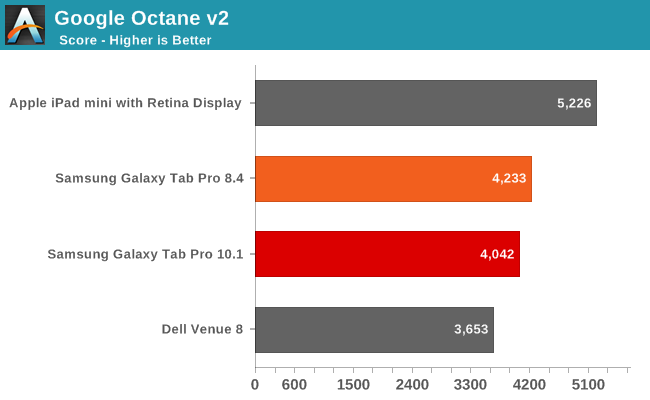
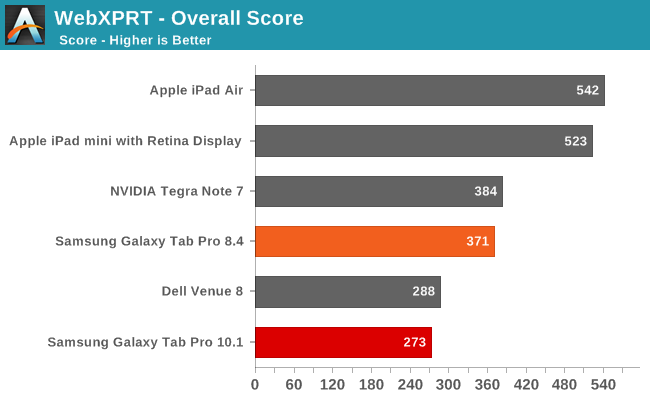
In terms of CPU speed, the Apple A7 chips still take the lead in all of our tests, though not always by a large margin. We’re also using different browsers (Chrome vs. Safari), and JavaScript benchmarks aren’t always the greatest way of comparing CPU performance. I ran additional benchmarks on the two Samsung tablets just to see if I could get some additional information; you can find a table of results for AndeBench, Basemark OS II, and Geekbench 3.
| CPU/System Benchmarks of Samsung Galaxy Tab Pro | |||
| Benchmark | Subtest | Tab Pro 10.1 | Tab Pro 8.4 |
| Andebench | Native | 13804 | 17533 |
| Java | 708 | 790 | |
| Basemark OS II | Overall | 865 | 1062 |
| System | 1542 | 1529 | |
| Memory | 419 | 503 | |
| Graphics | 1032 | 2555 | |
| Web | 838 | 724 | |
| Geekbench 3 | Single | 942 | 910 |
| Multi | 2692 | 2847 | |
| Integer Single | 1028 | 967 | |
| Integer Multi | 3135 | 3343 | |
| FP Single | 897 | 848 | |
| FP Multi | 3106 | 3080 | |
| Memory Single | 860 | 922 | |
| Memory Multi | 982 | 1391 | |
Interestingly, the Samsung Exynos 5 Octa 5420 just seems to come up short versus the Snapdragon 800 in most of these tests. However, there’s a bit more going on than you might expect. We checked for cheating in the benchmarks, and found no evidence that either of these tablets was doing anything unusual in terms of boosting clock speeds. What we did find is that the Pro 10.1 is frequently not running at maximum frequency – or anywhere near it – in quite a few of our CPU tests.
Specifically, Sunspider, Kraken, and Andebench had the cores hitting a maximum 1.1-1.3GHz. The Pro 8.4 meanwhile would typically hit the maximum 2.3GHz clock speed. The result, as you might imagine, is that the 8.4 ends up being faster, sometimes by a sizeable margin. Basemark OS II, Geekbench 3, and AnTuTu on the other hand didn’t have any such odd behavior, with the Pro 10.1 often hitting 1.8-1.9GHz (on one or more cores) during the testing, and when that happens it often ends up slightly faster than the Pro 8.4.
Which benchmark results are more "valid"? Well, that's a different subject, but as we're comparing Samsung tablets running more or less the same build of Android, we can reasonably compare the two and say that the 8.4 has better overall performance. Updated drivers or tweaking of the power governor on the 10.1 might change things down the road, but we can only test what exists right now.
Overall, both systems are sufficiently fast for a modern premium tablet, so I wouldn’t worry too much about whether or not you’re getting maximum clock speeds in a few benchmarks – in normal use you likely won’t notice one way or the other. But we’re only talking about the CPU performance when we say you won’t see the difference; let’s move over to the graphics benchmarks to see how the Galaxy Pro tablets fare.
Graphics Performance
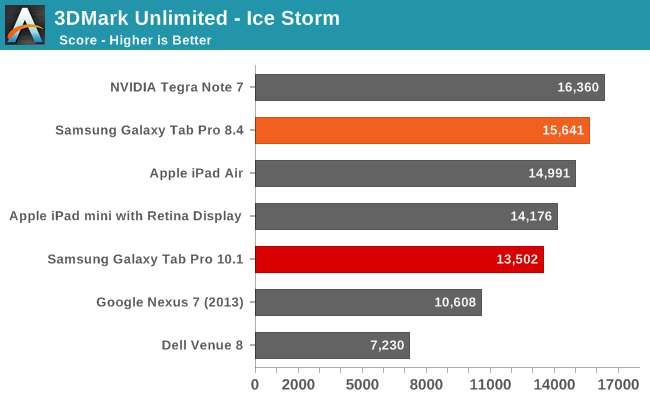
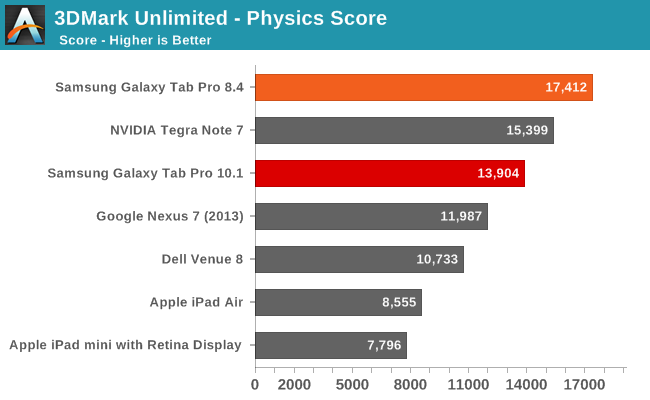
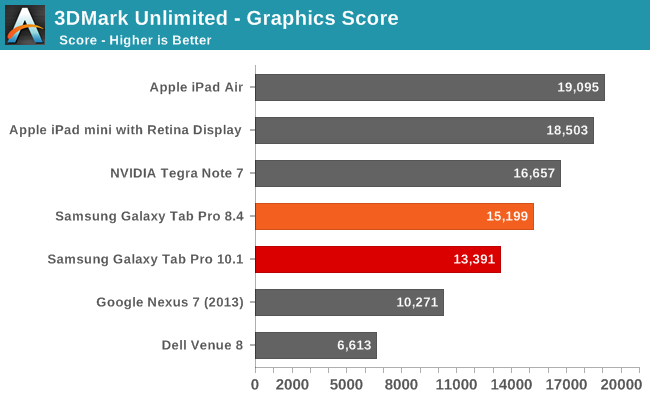
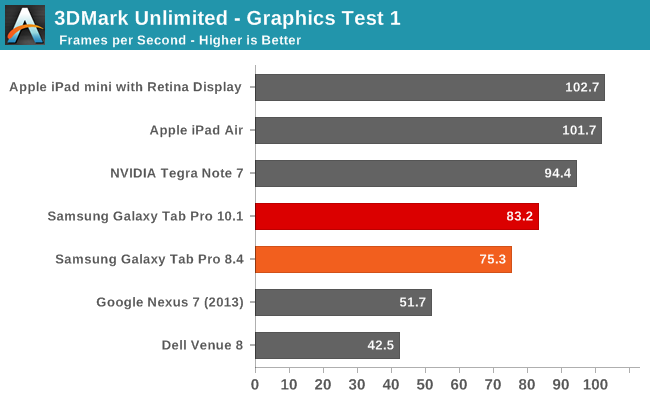
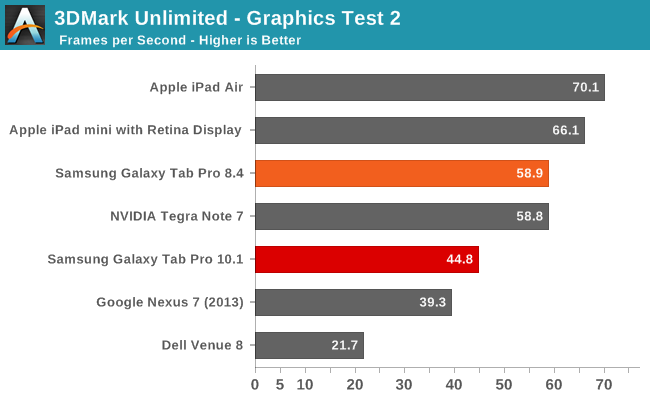
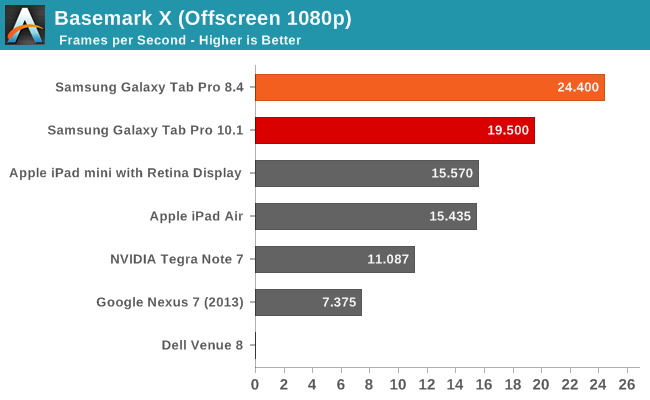
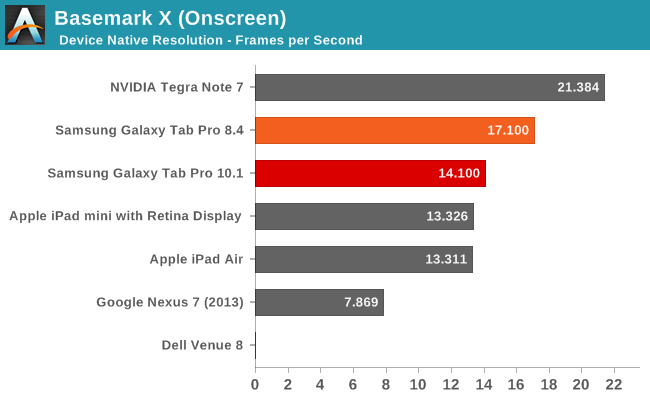
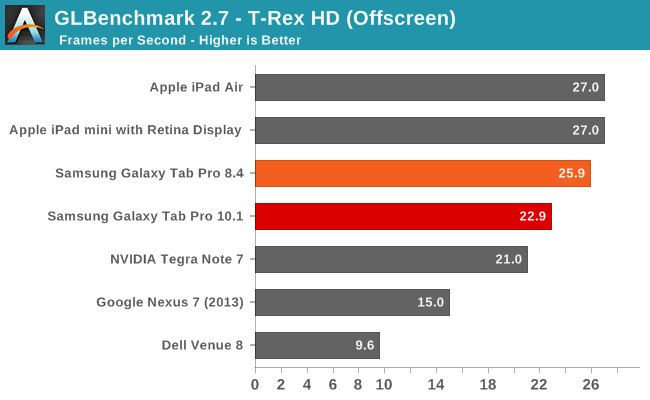
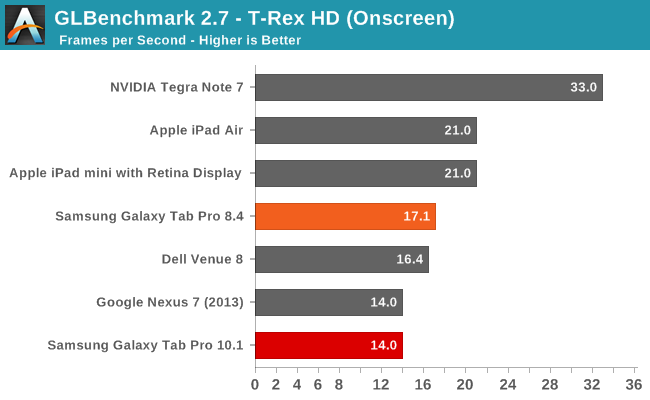
Outside of the 3DMark Unlimited Graphics Test 1 result, the Pro 8.4 sweeps the tables against its big brother. Playing games like Angry Birds Go! or any other reasonably demanding 3D titles in my experience confirms the above results – Adreno 330 beats the Mali-T628; end of discussion. I also had a few quirks crop up with the Pro 10.1 graphics, like Plants vs. Zombies 2 at one point stopped rendering all the fonts properly; a reboot fixed the problem, but I may have seen one or two other rendering glitches during testing. I have some additional results for GPU testing as well via GFXBench 3.0 if you’re interested:
| Graphics Benchmarks of Samsung Galaxy Tab Pro | |||
| Benchmark | Subtest | Tab Pro 10.1 | Tab Pro 8.4 |
| GFXBench 3.0 Onscreen | Manhattan (FPS) | 2.9 | 5.8 |
| T-Rex (FPS) | 14 | 17.1 | |
| ALU (FPS) | 13 | 59.8 | |
| Alpha Blending (MB/s) | 3295 | 6847 | |
| Fill (MTex/s) | 1956 | 3926 | |
| GFXBench 3.0 Offscreen | Manhattan (FPS) | 5.5 | 10.8 |
| T-Rex (FPS) | 22.9 | 25.9 | |
| ALU (FPS) | 25.6 | 138 | |
| Alpha Blending (MB/s) | 3093 | 7263 | |
| Fill (MTex/s) | 1956 | 3780 | |
The new Manhattan benchmark was one of the other tests where the Pro 10.1 didn’t seem to render things properly, and even then the Pro 8.4 ends up with nearly twice the frame rates. The ALU, Alpha Blending, and Fill rate scores might explain some of what’s going on, where in some cases the Pro 8.4 is more than four times as fast. Regardless, if you want maximum frame rates, I’d suggest getting the Pro 8.4 over the 10.1.










125 Comments
View All Comments
Reflex - Sunday, March 23, 2014 - link
1) Amazon is not in the business of selling a user to a third party, and in fact has strict internal policies for data use.2) Again, read the privacy policy. It is dramatically different from Google's. Amazon's goal is to sell you stuff directly, not to sell the customer as the product to third parties.
realtanu - Sunday, March 23, 2014 - link
+1theduckofdeath - Sunday, March 23, 2014 - link
"1) Amazon is not in the business of selling a user to a third party, and in fact has strict internal policies for data use."You could have fooled me with all of those 3rd party resellers using their portal. :)
Amazon does sell your information to third parties, they just do it using a slightly different model than Google.
Reflex - Sunday, March 23, 2014 - link
They actually do not. Create your own reseller via Amazon, anyone can do it. There are no options to purchase information on users, only information on your own product performance. Please actually read the agreements or set up a merchant account(free) to see for yourself. I know its popular to dismiss Google, Facebook and others with "Well everyone else does it" but there are several companies that do not and it is not any part of their business model. Amazon is one. Apple is another (and I dislike Apple, but facts are facts).R0H1T - Monday, March 24, 2014 - link
And you have definitive proof that Google sells your info to anyone else right ? AFAIK Google is known for targeted ads based on one's browsing history, through cookies which everyone else employs in the same way, or your gmail contents.Now the NSA/FBI/CIA et al have access to each of these firm's servers & data center residing in the US but that's the only thing(or entity) that has unrestricted access to your data, as for the rest I don't believe that Google shares everything they have on me & it's not like I have anything to hide nor have I put sensitive/personal info in public domain to begin with !
The user tracking you're alluding to is done the same way whichever firm you look at, the sharing of sensitive or personal info to non govt organizations is hard for me to believe because only FB does it, again AFAIK, & there's literally no proof of Google doing it in the manner what you've suggested.
grahaman27 - Saturday, March 22, 2014 - link
Most would consider it a massive drawback.Reflex - Saturday, March 22, 2014 - link
Given how well Amazon has done in the market I don't know that its 'most' actually. Some certainly do. Perhaps even many. But the Kindle devices are very large players in the space implying that for many it is not an issue.And again, better hardware, cheaper price, better security, better privacy, can sideload anything you need that isn't in the store.
JarredWalton - Sunday, March 23, 2014 - link
Better hardware? Or similar hardware? Better security? Doubtful -- different, yes, but not inherently better. Better privacy, perhaps. Sideloading is an option for all Android devices, so that's not really in the cards. Basically, it's as I said: if you can live without Google Play Services they're good devices.Reflex - Sunday, March 23, 2014 - link
Similar but Samsung is six months late and just prior to a new generation that will be coming later this summer. Furthermore they are more expensive with no significant improvements over the older hardware. And I will say 'better' because of build quality, the KF8.9 construction quality is excellent, something I have yet to see in any Samsung phone or tablet.The security of a curated app store is inherently better than the free for all that is Play services. I did not say that sideloading did not exist on others, only that if there is a must have app, you can get it on the Fire via sideloading if you need to.
And yes, if you need Google Play a KF is not a good device for you. But many people can live without it, as demonstrated by the KF marketshare.
JarredWalton - Sunday, March 23, 2014 - link
I'm like many in that I have purchased a number of apps via the Google Play Store over the past few years, which means shifting away from it I would lose over $100 worth of software. I suppose if I had started with the Amazon store I'd be in the reverse situation. I haven't spent time with the Kindle so I can't really say whether build quality is better, but I have no complaints with the Galaxy Pro offerings. Sure, the faux-leather plastic backing isn't the best thing ever, but it felt fine to hold and use on a regular basis.